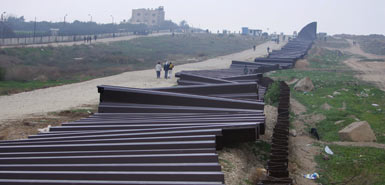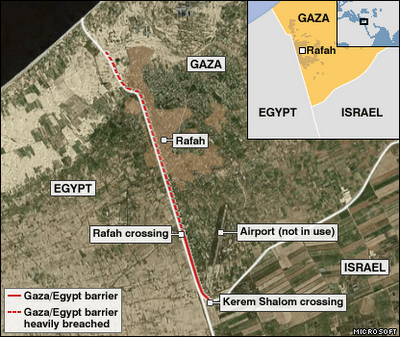The
Jerusalem Post reports that Palestinians are losing faith in not only Fatah, but also Hamas.
Fatah still commands a strong lead over Hamas that controls Gaza, with 39 percent of Palestinians trusting it, as opposed to 16 percent backing for Hamas. But in November, 46 percent of those surveyed for a similar poll favored Fatah, and 13 percent backed Hamas. Forty-one percent of those polled said they didn't trust either faction, up from 32 percent in November. |
The article goes on to state.
While most Palestinians trust and approve Fatah's peace moves, they have little trust in Fatah's ability to improve their own living conditions, said Jamil Rabah, director of Near East Consulting. "People don't have a problem with the thinking and ideology of Fatah, but they are not happy with the symbols and leaders of Fatah," Rabah said. "They are getting so much money, but will they bring an end to the (deteriorating) situation?" |
A plurality of Palestinians (41%) do not trust Fatah or Hamas to improve their living conditions despite donor nations promising $7.4 billion over the next three years. In addition, Palestinian trust and approve of Fatah's peace moves.
Hamas took over Gaza due to is popularity slipping. The polls show their coup has not helped their popularity, standing in the teens.
So, what is the significance here?
First, this is the first poll I have seen that a plurality (41%) do not trust Fatah or Hamas
Second, this is also the first poll I have seen where a majority ("most" according to the article) want peace with Israel.
Third, Hamas, who won the Palestinians first elections, now only have support of 16% of the population.
Finally, Palestinians only had a choice between two parties in their first democratic election. Having lost faith in Fatah, they brought Hamas into power. Having seen that Hamas also does not have their best interest at heart, Palestinians became disenchanted Hamas. However, instead of support moving to Fatah, it has now moved to a third, yet undetermined faction or faction who will lead the Palestinians to peace with Israel and serve the people who elected it into power.
I have stated this
before in this blog. The fascinating dynamic of the January 2006 election is not that the Palestinians were able to freely elect Hamas into power, but that Hamas (and Fatah) could be unelected in the future if they did not govern
for the people since they were now elected by the people.
It now appears the Palestinians would vote both parties out of power. This is the gift the Palestinians were given in January 2006. Many concluded the Palestinians squandered this gift by voting Hamas into power. I contend they did not vote Hamas into power as much as they voted Fatah out of power due to its inability to govern for them. For its part, Fatah rather peacefully conceded power, a first for Palestinians.
Fatah, for its part, seems to have generally gotten the message, and its leaders are attempting to govern for the people to a certain extent. Hamas, on the otherhand, conducted a coup in Gaza to maintain its hold on power. Both parties poll data reflect accurately the amount of trust Palestinians now put in their parties.
Israel should use this poll data to push for peace with the Palestinians. In addition, America should help the Palestinians find a leader for the disenchanted 41% who neither favor Fatah or Hamas and who will govern for the people.
However, even without America's or Israel's meddling, the Palestinians were given a special gift, the gift of democracy, in January 2006. As with all young democracies (
including our own), it initially has to overcome significant graft, develop the spirit of a democracy, and fully understand what a democracy gives to its people. This two year old democracy is still young and learning. It is no older or wiser at this point than is a toddler. In fact, some may say, it has entered into its "terrible twos". Yet, this young democracy will continue to grow and florish. It will go through puberty, sweet sixteen, and finally become a respectable adult providing for it children.
Everybody wants to end the Palestinian crisis, but what is forgotten is the Palestinian Liberation Organization (PLO) was ended on January 2006. It is now something completely different. It is a democracy. Its people were liberated, not from the Israelis, but from their own totalitarian rulers. Yes, Hamas brought forth a coup in Gaza to retain power, but Fatah is moving ahead with peace towards Israel and peace for its people. Right now there are two divided Palestinian areas, but over time, the
power of the people will reunite these separated people.
George Washington gave this country
a gift on 23 December 1797. Another George gave the Palestinians a gift on 25 January 2006 as part of the Bush Doctrine which declared one of the goals of the United States was to spread of democracy to prevent the rise or continuation of terrorist's regimes. While not yet a fully developed democracy, the Palestinian people are going through their "terrible twos" enroute in their path to get there.
Labels: Fatah, Hamas, Israel, Middle East, Palestinians




